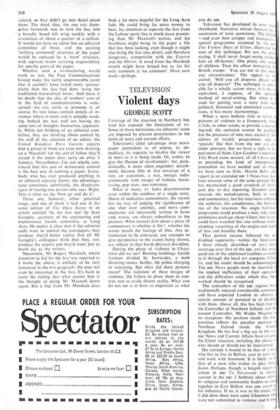TELEVISION
Violent days
GEORGE SCOTT
Coverage of the situation in Northern Ire- land has exposed the limitations of TV. Some of those limitations are inherent; some are imposed by present practitioners in the fields of news and current affairs.
Television's chief advantage over news- paper journalism is, of course, its im- mediacy, its capacity to involve the viewer in news as it is being made. Or, rather, to give the illusion of involvement: for, para- doxically, it more often engenders detach- ment, because film or live coverage of a riot, an execution, a war, merges indis- criminately with images of fashion, horse- racing, pop stars, zoo romances.
What is more, TV lacks discrimination even within the confines of a single story. Shorn of indicative commentary, the viewer has no way of judging the significance of one shot over another, and news com- mentaries are necessarily written in haste and, worse, are always subordinate to the pictures. What matters first about a piece of commentary is whether it 'fits': whether the words match the footage of film. Any in- formation to be conveyed, any attempts to give perspective to the events being shown, are subject to that harsh physical discipline.
During the phase of violence in Ulster, what did we see? Burning buildings, hostile factions divided by barricades, a mob throwing stones, bottles, the police charging or retreating. But what did these pictures mean? The isolation of these images of violence, the failure to place them in con- text, can so easily distort reality. What you do not see is at least as important as what
you do see.
Television has developed its own vis shorthand. Narrative moves forward by succession of terse quotations. The belate —and even then scrappy and inadequate special programme mounted by the a The Violent Days of Ulster, illustrated th uses of this technique. We saw the pile saying, 'I shall never forget seeing childre loot an off-licence.' One priest, one
emu
of children. Then the officer instructing th British troops: 'You are not to fire unde any circumstances.' The appeal to tb crowd: `Will you all disperse, please, va you all disperse?' The technique is admi able for a wholly action story; it is the is equivalent, I suppose, of the episodi method of novel-writing. But when it used for putting over a story with suc political, historical and emotional ramifica tions, it has many shortcomings.
When a news bulletin fails to relate il pictures of violence to a framework. whc it fails, in other words, to provide a measu ing-rod, the omission cannot be justified but the pressures of time may excuse it. Th editors of weekly programmes and o 'specials' like that from the BBC are al% under pressure, but we have a right to ex- pect more of them. Llew Gardner's report f This Week came nearest, of all I have see to providing the kind of interpretati% journalism we have needed and of whic we have seen so little. Martin Bell's abl report in an extended sac I News four day later covered some of the same ground. Bel has maintained a good standard of intelli- gent day to day reporting. Gardner tend towards the melodramatic, both in voic and commentary, but his interviews reflecte the subleties, the complexities, the human; ties of the situation. No single half-hou programme could produce a nice, tidy, com- prehensive package about Ulster, but no one could have watched this one without under- standing something of the origins and dept of fear and hostility there.
That partial success followed the un doubted superiority—within the limitation I have already described—of im's new coverage over that of the BBC. ITN has mad good use of the additional facilities availab to it through the local fly company, Ulste TV, and the credit should be acknowledged The BBC News people must be resentful o the implied inefficiency of their operatio and the difficulties under which they hay- worked should be recognised.
The controllers of the sac regions has traditionally enjoyed considerable autonom, and have expected London to obserse certain amount of protocol in its dealing with them. Above all, this has been true o the Controller of Northern Ireland, and th present Controller, Mr Waldo Maguire, I no exception. His position inside the Cor poration reflects the peculiar position o Northern Ireland inside the Unit Kingdom. He has had a big say in the way itsc News and Current Affairs have covered the Ulster situation, including the choice o who should or should not be interviewed.
His attitude is bound to be that of a man who has to live in Belfast, year in year out and work with Stormont. It is likely to that of a man who wishes to play thing down. Perhaps, though, a longish report I colour in BBC 2's Newsroom (a shone version in the sac I bulletin) about effort by religious and community leaders to wor together in East Belfast, was one result o his influence. If so, it was to his credit, fo it did show there were some Ulstermen wb were not committed to violence and hair


































 Previous page
Previous page